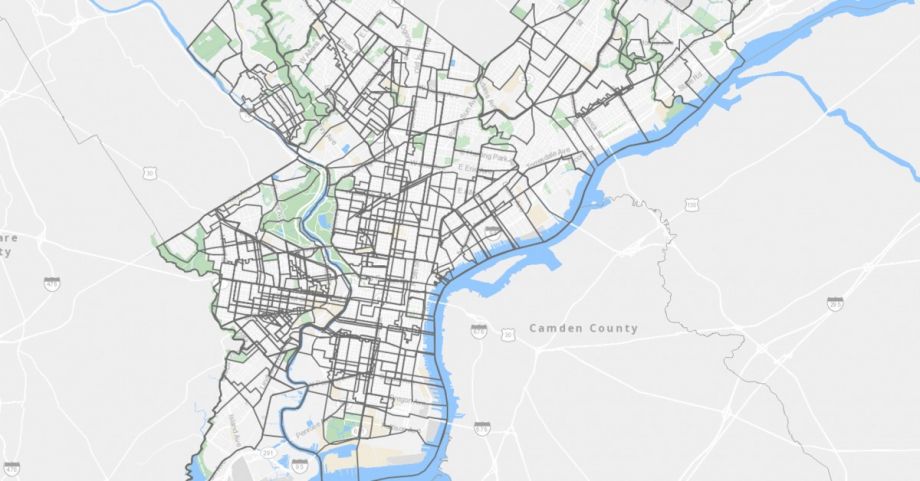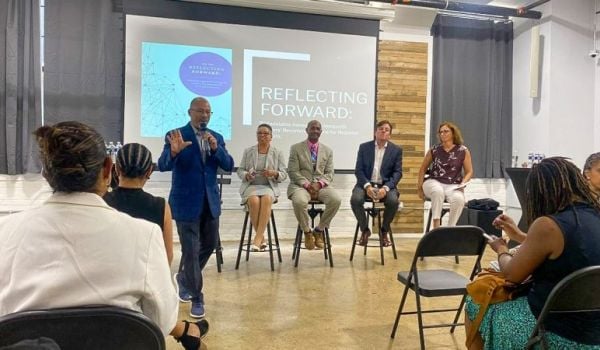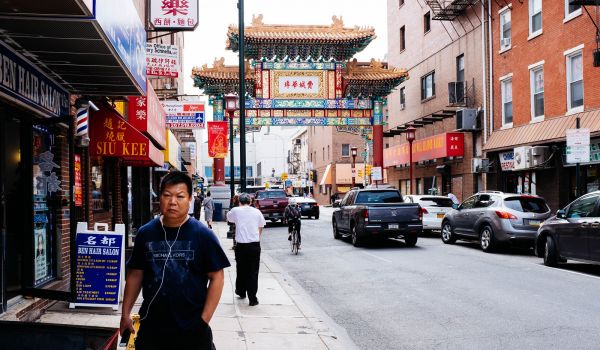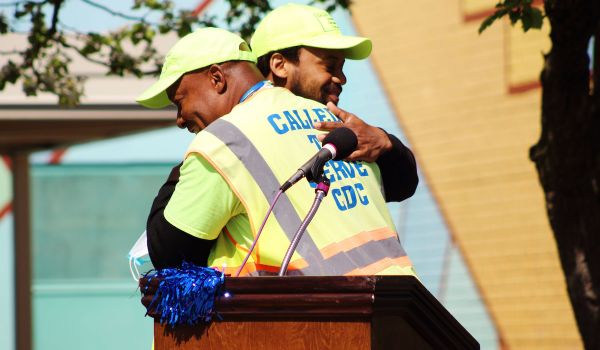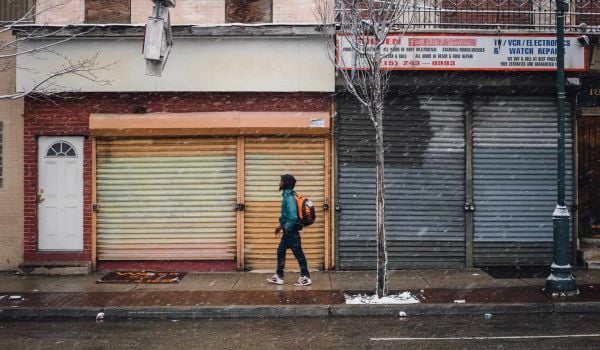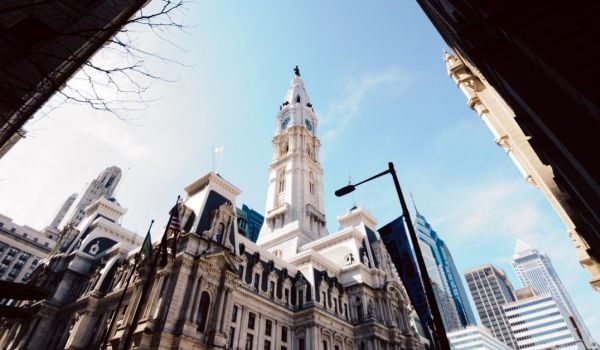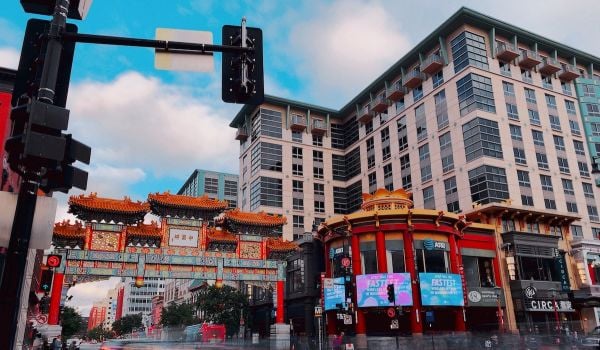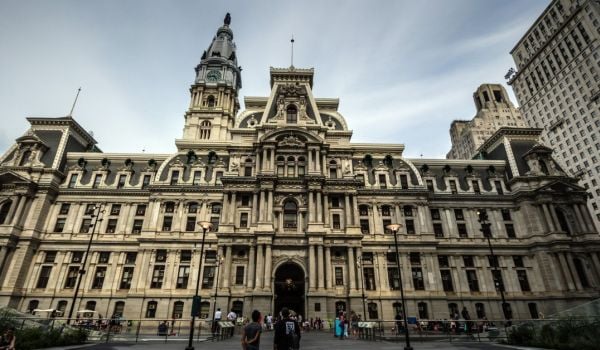On the first Tuesday of every non-summer month, for at least the last 10 years, the Passyunk Square Civic Association in South Philadelphia has hosted a neighborhood meeting, to discuss everything from tree planting to parking and new construction. Typically the meetings are held at a local senior center. But when the coronavirus-related social-distancing guidelines went into effect, the civic association, like dozens of others around the city, had to cancel in-person meetings. In May, aware that the city’s Office of Transportation, Infrastructure, and Sustainability (OTIS) was still moving ahead with planning a streetscape improvement project on Washington Avenue, a major artery on the northern edge of the neighborhood, the association decided to try holding its meeting virtually.
“We thought, ‘OK, we’ll give this a try,’” says Sarah Anton, the association’s president. “We were happy to experiment with [OTIS], and it went pretty well.”
The association did its typical outreach, mostly through email and its website, Anton says, and used Zoom to host the meeting. Anton facilitated public participation. There are limits to what volunteer groups like hers can do in terms of outreach, Anton says, but the meeting was fairly successful. If it had to host all its meetings online, the group could make it work, she says. But Passyunk Square is a relatively well-off neighborhood in Philadelphia, and community associations’ access to and comfort with video-conferencing technologies may vary greatly from neighborhood to neighborhood. How groups like the Passyunk Square Civic Association negotiate their mandates to cultivate local engagement with construction projects during a time of social distancing could have important consequences for the health of neighborhood democracies, and for the city’s overall development.
When Philadelphia rewrote its zoning code in 2012, it created a formal avenue for civic associations to participate in the zoning process. Previously, groups like Passyunk Square Civic Association had only informal levers to influence local development projects. Under the revised rules, the association is one of hundreds of Registered Community Organizations (RCOs), which developers are required to meet with when they’re seeking variances from the zoning code, which they must do when they propose buildings that are taller or denser than the code allows — a common occurrence. As Philadelphia tries to chart a recovery from the sudden economic downturn caused by the pandemic, officials say it will need to restart hearings of the Zoning Board of Adjustment, which grants code variances. And restarting those meetings will require RCOs to have clear procedures in place to hold meetings with developers, so the public can comment on project proposals.
“They need to be equitable with all of the [RCOs],” Anton says. “I worry that if we say, ‘We can do it, no problem,’ that that becomes a signal that it can be done.”
The Planning Commission, which keeps the official rolls of Registered Community Organizations, is trying to figure out what capacity those organizations have to hold meetings virtually. In May, the Commission sent RCOs a survey, asking what technologies that they had access to and were comfortable using, as well as what their community’s most immediate needs are. The survey was sent to 268 RCOs, and 99 responded, according to results shared by the Planning Commission. A third of respondents had already conducted remote meetings, and nearly 60 percent said they did not need city assistance to host a meeting remotely. Still, a quarter of RCOs that responded to the survey said that “less than half” of their community members had access to the Internet. And a third said that “less than half” of the community could participate in remote meetings. The Commission also has no way of knowing why more than half of the RCOs didn’t respond at all.
The Commission is proceeding cautiously, wary of making any indication that RCOs should start meeting in-person again while COVID-19 is still being spread around the city, says Eleanor Sharpe, the executive director of the Philadelphia City Planning Commission.
“Our concern, as government, is health and safety — that’s what comes first,” Sharpe says. “We didn’t want to send any signals that would compromise anyone’s safety.”
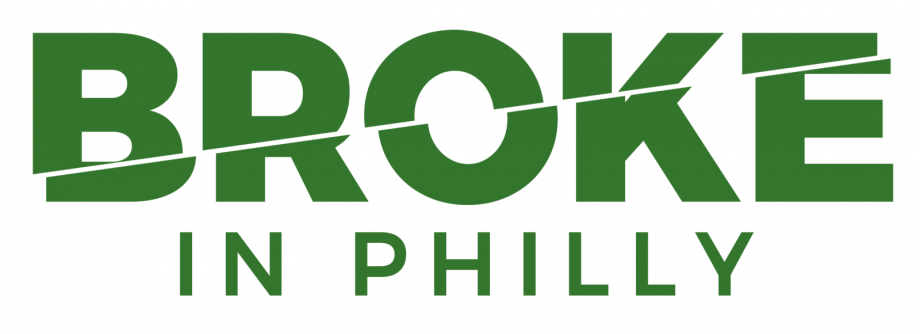
Sharpe says the city wants to make sure that all RCOs have the same ability to conduct zoning business before the process starts up again. Meanwhile, many RCOs are looking to the city for guidance about how to proceed. De’Wayne Drummond, the president of Mantua Civic Association, says the group has begun experimenting with holding some meetings virtually. But he notes that there is a wide digital divide in the neighborhood, and says the association has concerns about how best to reach everyone who might want to participate in meetings.
“I haven’t seen a manual to come out and say ‘This is a possible way [to hold meetings],’” Drummond says. “I haven’t seen a toolkit or anything. As you know, a lot of the RCOs are volunteer groups, so we need some type of toolkit to help us.”
The Philadelphia City Planning Commission has already started holding its monthly meetings virtually, and Sharpe says they have gone pretty smoothly, including the public participation elements. But the Planning Commission’s role is advisory, whereas the Zoning Board of Adjustment makes rulings. That raises the stakes for ensuring that all the right procedures are in place, to minimize legal liability — either from developers or neighborhood residents who might want to appeal a decision. The Planning Commission and the Law Department are making sure that all meetings can be properly advertised and people can have a chance to participate before the hearing calendar can begin again, and Sharpe says that technology to hold the hearings is far from the biggest concern.
“The Zoning Board of Adjustment … is quasi-judicial. It’s not just about standing up a meeting,” Sharpe says. “It has serious impacts of liability, and if the rules of order aren’t followed it could open us to appeal and litigation. It’s not as simple. There are a lot of pieces to set in motion.”
In Fishtown, one of the city’s busiest neighborhoods for development, the Fishtown Neighbors Association had typically been holding two zoning meetings a month to consider various projects, says Ian Wilson, the group’s zoning chair. Usually it holds a straw poll about projects at its meetings, and reports two votes to the zoning board — one vote for near-neighbors and one for the whole neighborhood. Those votes don’t necessarily determine the outcome at the hearing, but they’re important expressions of the neighborhood’s attitude. The Fishtown Neighbors Association has “a pretty strong social media presence,” Wilson says, but there are still limits to who the group can reach under social-distancing guidelines, with particular concerns about making sure older people are included.
“We don’t want to disenfranchise anyone because they don’t see an Instagram post,” Wilson says.
Wilson says that creating a fair and trustworthy online voting system, in all types of scenarios, is a nut that no one has been able to crack yet, and he doesn’t expect the city to figure it out for RCOs. And volunteer groups like the Fishtown Neighbors Association already spend money on insurance to protect themselves from lawsuits, which have led to some civic associations’ demise before. So RCOs are waiting for the city to take the lead.
“What we really need from the city is guidance on what their requirements are going to be,” Wilson says.
At the end of May, Sharpe sent an email to all RCOs saying that the Planning Commission was still not expecting or recommending that the groups hold in-person meetings with developers. Later in June, the Planning Commission adopted temporary regulations providing some additional time for RCOs to conduct meetings around certain development applications during a period starting with the city’s emergency declaration and March and extending to at least the end of September, and permitting virtual meetings as a fulfillment of the requirement. The Zoning Board of Adjustment also adopted temporary regulations adjusting the timing on notice requirements during the affected period, and outlining rules of order for virtual hearings. Currently, ZBA hearings are tentatively scheduled to restart in mid-July.
Sharpe says it’s not likely the city is going to offer any kind of direct material support to RCOs to help them conduct their zoning meetings. But she says the Planning Commission is focused on offering guidance to the RCOs with the fewest resources on how to get a process in place to meet with developers about zoning requests. If the “most vulnerable” RCOs are able to figure out how to hold online meetings — safely and in accord with all the legal requirements — then it may be safe to start the process again, Sharpe says.
“I think this [social distancing] is going to be for the long haul, so we really want to set the system up so the development-regulatory process gets back on track, and does not leave anyone behind,” she says.
This story was produced in collaboration with WHYY and with support from Broke in Philly, a collaborative reporting project on solutions to poverty and the city’s push toward economic justice. Next City is one of more than 20 news organizations in the collective. Follow us on Twitter @BrokeInPhilly.

Jared Brey is Next City's housing correspondent, based in Philadelphia. He is a former staff writer at Philadelphia magazine and PlanPhilly, and his work has appeared in Columbia Journalism Review, Landscape Architecture Magazine, U.S. News & World Report, Philadelphia Weekly, and other publications.
Follow Jared .(JavaScript must be enabled to view this email address)

